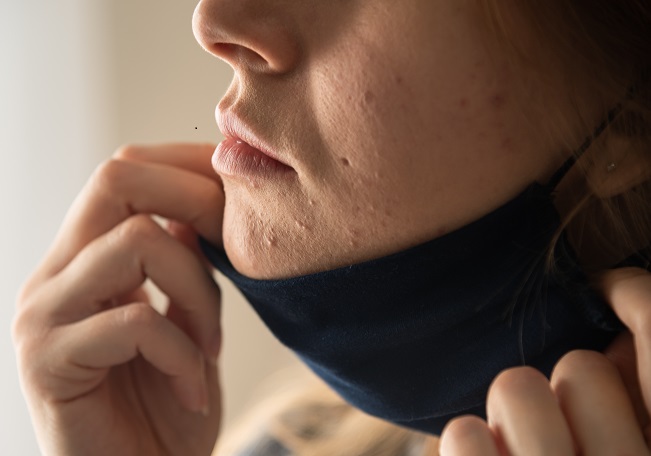
Prevent Skin Problems from Face Mask
March 23, 2021 3:00 pmThough wearing face masks play a big role in reducing the spread of the coronavirus, it can also cause havoc on your skin. Causing problems from acne and peeling skin to rashes and itchiness. To help prevent skin problems from developing under your mask Dr. Melamed has a few tips to remedy skin issues.
Dry Skin
Dry skin is a common skin issue from wearing face mask. Applying moisturizer adds a protective layer that can reduce dryness and build a protective barrier.
To get the best benefit from a moisturizer you must use a product that is right for your skin type. Think of your skin as your first line of defense from the outside elements. Your skin’s resilient comes from the following levels of protection:
- Ceramides are the lipids (natural fats) found naturally in the uppermost layers of skin. Since lipids are not water soluble, they form a natural barrier to retain your skin’s moisture. As you age your skin becomes depleted in ceramides and more vulnerable to premature aging, wrinkles, and damage. This process starts in your early 20s and accelerates as you get older.
- Hyaluronic acid (HA) is the molecule in your skin that gives you moisture, thickness, and youthfulness. It is a sugar molecule that loves to absorb water to keep your skin hydrated and plump. Like ceramides the hyaluronic acid levels become depleted starting the early 20s. Diet, hydration, and UV exposure, and genetics are amongst the top factors have a strong on HA depletion. Eating fruits and vegetables, exposure to of antioxidants and using sunscreen will protect the skin.
Acne & Breakouts
You can prevent breakouts from your moisturizer by using the right moisturizer formulated for your skin type. When selecting moisturizer, use the following guideline:
- Oily skin – Gel moisturizer
- Normal or combination skin – Lotion
- Dry to very dry skin – Cream, ceramides, and/or emollients
If you have acne or tend to break out, you still need a moisturizer. Apply gel moisturizer before and after wearing a mask.
Chapped Lips
Protect your lips by applying petroleum jelly. Dry skin and chapped lips are common problems from wearing face mask. You can prevent chapped lips by applying petroleum jelly to your lips after washing your face, before you put on your mask, and before bed.
Skip the makeup when wearing a mask
Makeup is more likely to cause clogged pores that lead to breakouts underneath a mask. This will lead to clogged pores and breakouts. If makeup is necessary, use products that are labeled “non-comedogenic”, meaning it won’t clog pores.
Retinoids (Retinol)
Retinoids can irritate your skin, leaving it dry, red and flakey. If you need to use a retinoid product, only apply at bedtime, wash your face in the morning, and make sure to wear sunscreen during the day.
Remove mask when it’s safe
Safe places to remove your mask include:
- Outdoors, when you can stay at least six feet away from people
- Inside your car when you’re alone
- At home
- Or when interacting with other vaccinated friends and family
Wash your cloth masks
Make sure to replace your facemask daily by washing fabric masks or replacing disposable masks. Washing cloth masks removes oils and dirt that collect inside the mask that can lead to skin problems. Use a gentle wash without fragrance and heavy scents, as certain chemicals can also irritate the skin.
Meet with Dr. Melamed to discuss the best options for managing your skin with the right combination of care.
Tags: Acne, dry skin, hyaluronic acid, RosaceaCategorised in: Uncategorized


Comments are closed here.